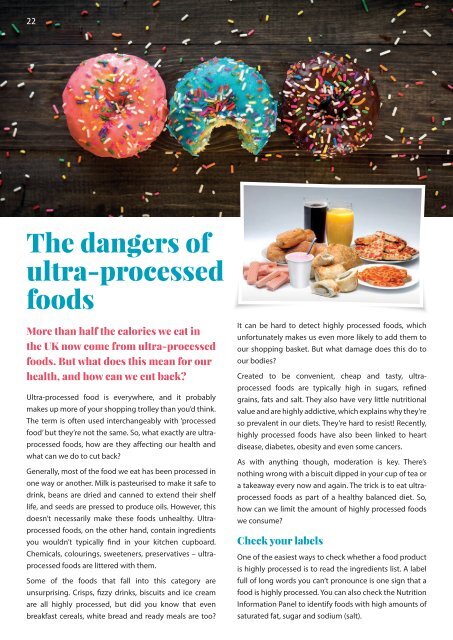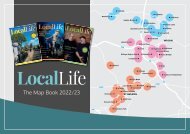Local Life - Wigan - March 2022
Wigan's FREE local lifestyle magazine.
Wigan's FREE local lifestyle magazine.
Create successful ePaper yourself
Turn your PDF publications into a flip-book with our unique Google optimized e-Paper software.
22<br />
The dangers of<br />
ultra-processed<br />
foods<br />
More than half the calories we eat in<br />
the UK now come from ultra-processed<br />
foods. But what does this mean for our<br />
health, and how can we cut back?<br />
Ultra-processed food is everywhere, and it probably<br />
makes up more of your shopping trolley than you’d think.<br />
The term is often used interchangeably with ‘processed<br />
food’ but they’re not the same. So, what exactly are ultraprocessed<br />
foods, how are they affecting our health and<br />
what can we do to cut back?<br />
Generally, most of the food we eat has been processed in<br />
one way or another. Milk is pasteurised to make it safe to<br />
drink, beans are dried and canned to extend their shelf<br />
life, and seeds are pressed to produce oils. However, this<br />
doesn’t necessarily make these foods unhealthy. Ultraprocessed<br />
foods, on the other hand, contain ingredients<br />
you wouldn’t typically find in your kitchen cupboard.<br />
Chemicals, colourings, sweeteners, preservatives – ultraprocessed<br />
foods are littered with them.<br />
Some of the foods that fall into this category are<br />
unsurprising. Crisps, fizzy drinks, biscuits and ice cream<br />
are all highly processed, but did you know that even<br />
breakfast cereals, white bread and ready meals are too?<br />
It can be hard to detect highly processed foods, which<br />
unfortunately makes us even more likely to add them to<br />
our shopping basket. But what damage does this do to<br />
our bodies?<br />
Created to be convenient, cheap and tasty, ultraprocessed<br />
foods are typically high in sugars, refined<br />
grains, fats and salt. They also have very little nutritional<br />
value and are highly addictive, which explains why they’re<br />
so prevalent in our diets. They’re hard to resist! Recently,<br />
highly processed foods have also been linked to heart<br />
disease, diabetes, obesity and even some cancers.<br />
As with anything though, moderation is key. There’s<br />
nothing wrong with a biscuit dipped in your cup of tea or<br />
a takeaway every now and again. The trick is to eat ultraprocessed<br />
foods as part of a healthy balanced diet. So,<br />
how can we limit the amount of highly processed foods<br />
we consume?<br />
Check your labels<br />
One of the easiest ways to check whether a food product<br />
is highly processed is to read the ingredients list. A label<br />
full of long words you can’t pronounce is one sign that a<br />
food is highly processed. You can also check the Nutrition<br />
Information Panel to identify foods with high amounts of<br />
saturated fat, sugar and sodium (salt).

















